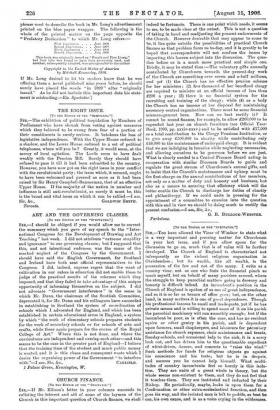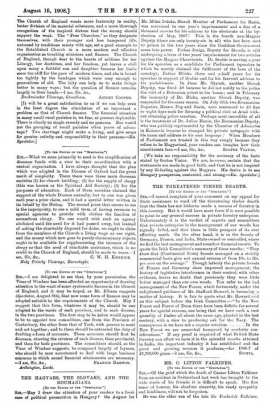[To THE EDITOR Or TUE -sescrA.Tort.n SIB,—You have allowed the
Vicar of Windsor to state what is a very important and pressing matter for Churchmen in your last issue, and if you allow space for the discussion to go on, much that is of value will be further developed. The Church of England is characterised not infrequently as the richest religious organisation in Christendom ; but its wealth, like all wealth, is the possession of the few and not of the many. I write as a country vicar, not as one who feels the financial pinch so much myself, but on behalf of many parishes around, where the struggle to keep parochial matters going in decency and honesty is difficult indeed. An incumbent's position in the Church of England is spoken of as one of great independence, and so it is so far as tenure of office goes ; but, on the other band, in many matters it is one of great dependence. Though his professional income be small and inadequate, yet if be has private means and is willing to spend some of it on his parish the parochial machinery will run smoothly enough; but if the incumbent be poor, as is often the case, and has no resident squire or other gentry in his parish, and is dependent upon farmers, small shopkeepers, and labourers for pecuniary assistance for church expenses, choir maintenance and treats, Sunday-schools, and occasional help to the sick, it is a sorry look out, and has driven him to the questionable expedient of whist-drives, dances, and concerts to "raise the wind." Such methods for funds for religious objects go against his conscience and his taste; but he is in despair, and assures you he cannot help himself. What multi- tudes of country incumbents feel so keenly is this isola- tion. They are units of a great whole in theory, but the whole seems non-existent to them, and they do not feel that it touches them. They are instituted and inducted by their Bishop. He periodically, maybe, looks in upon them for a Confirmation or other extra-ecclesiastical function, and then goes his way, and the isolated man is left to paddle, as best he can, his own canoe, and is as a voice crying in the wilderness.
The Church of England wants more fraternity in reality, better division of its material substance, and a more thorough recognition of the inspired dictum that the strong should support the weak. The "Free Churches," as they designate themselves, with their younger and less hampered life, unbound by traditions musty with age, set a good example to the Established Church in a more modern and effective organisation as touching ministers and finance. The Church of England, though dear to the hearts of millions for her Liturgy, her doctrines, and her freedom, yet leaves a chill upon many a faithful son and daughter because her limbs seem too stiff for the pace of modern times, and she is bound too tightly by the bandages which were easy enough to generations of old. The laity can help us to make things better in many ways ; but the question of finance remains largely in their hands.—I am, Sir, &c.,
Buckminster Vicarage, Grantham. ASTLEY COOPER.
[It will be a great satisfaction to us if we can help even in the least degree the elucidation of so important a problem as that of Church finance. The financial situation in many small rural parishes is, we fear, at present deplorable. There is clearly no single remedy and no panacea. But would not the grouping of small parishes often prove of advan- tage? Two starvinga might make a living, and give scope for greater activity and responsibility in their parsons.—ED. Spectator.]







































 Previous page
Previous page